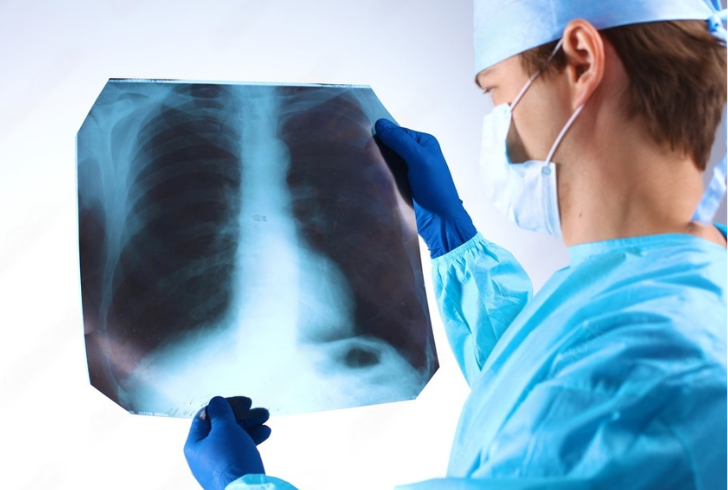
Can Asthma Cause Lung Nodules?

Have you ever come across the term “lung nodule” during a medical report? These mysterious little lumps in the lung can trigger a wave of anxiety. What exactly are they? Are they cancerous? Can asthma cause lung nodules?
These questions are common among individuals who discover these abnormalities in their lung tissue.
What Are Lung Nodules?

Freepik | Lung nodules are typically found incidentally on chest X-rays or CT scans and can be solid or fluid-filled.
Lung nodules are essentially small, round masses of tissue found within the lungs. Often detected incidentally on chest X-rays or CT scans, they can be solid or fluid-filled. Thankfully, the majority of lung nodules are benign, meaning they’re not cancerous. However, a small percentage can be malignant, highlighting the importance of proper diagnosis and follow-up.
The size of a lung nodule plays a crucial role. Tiny nodules, usually less than a centimeter (think dime-sized), often don’t cause any symptoms and may not require immediate treatment. On the other hand, larger nodules or those causing breathing difficulties warrant further investigation.
Can Asthma Cause Lung Nodules?
While asthma itself doesn’t directly cause lung nodules, the chronic inflammation associated with asthma can create scarring in the lung tissue. These scar formations, in rare instances, can appear as nodules on an X-ray. However, it’s important to note that these are not cancerous and typically don’t pose a health risk.
Causes of Lung Nodules

Freepik | wirestock | Cigarettes damage lung tissue and increase the risk of lung nodules and cancer.
The culprits behind lung nodule formation are a varied bunch. Here are some of the leading causes:
- Infections – Bacterial and viral infections, like pneumonia or influenza, can trigger inflammation leading to nodule development.
- Smoking – Cigarettes are a major culprit, damaging lung tissue and increasing the risk of lung nodules and cancer.
- Chronic Obstructive Pulmonary Disease (COPD) – This group of lung diseases, including emphysema and chronic bronchitis, can lead to nodule formation due to ongoing inflammation.
- Environmental Exposures – Inhaling dust, asbestos, or other irritants can irritate the lungs and contribute to nodule development.
When to Seek Medical Attention
While most lung nodules are harmless, some symptoms warrant a doctor’s visit:
- Persistent cough, especially with blood
- Shortness of breath
- Chest pain, particularly when taking a deep breath or coughing
Diagnosis and Treatment Options

Freepik | In some cases, antibiotics (for infections) or steroids (for inflammation) may be prescribed for lung nodules.
If a lung nodule is discovered, your doctor will likely recommend further tests to determine its nature. These may include chest CT scans, PET scans, or even a biopsy, where a small tissue sample is extracted for analysis.
The course of treatment depends on the underlying cause and the characteristics of the nodule. Here’s a glimpse into some treatment options:
- Monitoring: For small, benign nodules, regular monitoring with chest X-rays may be sufficient.
- Medication: In some cases, medications like antibiotics (for infections) or steroids (for inflammation) might be prescribed.
- Surgery: If the nodule is large, cancerous, or causing symptoms, surgical removal may be necessary.
Living Well with Lung Nodules
Lung nodules can be unsettling, but knowledge is empowering. By understanding the causes, symptoms, and treatment options, you can navigate this situation with confidence. Remember, early detection is key. If you have any concerns, don’t hesitate to consult your doctor. They can guide you through the diagnostic process and recommend the most appropriate course of action for optimal lung health.
More in Medical Conditions
-
Top 8 Japan Tokyo Tourist Traps to Avoid and Where to Go
Tokyo, Japan’s bustling capital, is a city of contrasts, blending modern skyscrapers with ancient temples. With its vibrant culture, advanced technology,...
August 23, 2024 -
How to Feel Good Every Day and Overcome Self-Doubt
How often do you wonder, “Am I good enough?” These thoughts can be exhausting, whether they concern your role as a...
August 16, 2024 -
How to Stay Healthy During Flu Season: 8 Ways to Protect Yourself
Flu season can be a challenging time, but understanding how to stay healthy during flu season can make all the difference....
August 9, 2024 -
What Is the Best Short Hairstyle for Over 60?
Finding the right hairstyle can make all the difference, especially when dealing with the challenges of fine hair. Plenty of short...
August 3, 2024 -
How to Get Out of a Depressive Slump With These Simple Tips
When feeling stuck in a depressive slump, it might seem like there’s no way out. However, understanding how to get out...
July 25, 2024 -
Is IBS a Disability? Here’s Everything You Need to Know
Irritable bowel syndrome (IBS) affects millions globally, presenting a complex mix of symptoms that can severely disrupt daily life. This condition...
July 20, 2024 -
What to Pack for a Cruise to the Bahamas – An Expert’s Checklist
Heading out on a Bahamas cruise promises an unforgettable vacation filled with stunning beaches, vibrant culture, and endless fun. To make...
July 10, 2024 -
Is Tequila a Depressant or an Upper?
When we think of alcohol, we typically consider it a depressant because it slows down brain activity, neural functions, and the...
July 5, 2024 -
Is It Safe to Travel to Paris? Essential Tips for Tourists
When considering a trip to Paris, one of the first questions that often arises is, “Is it safe to travel to...
June 20, 2024










You must be logged in to post a comment Login